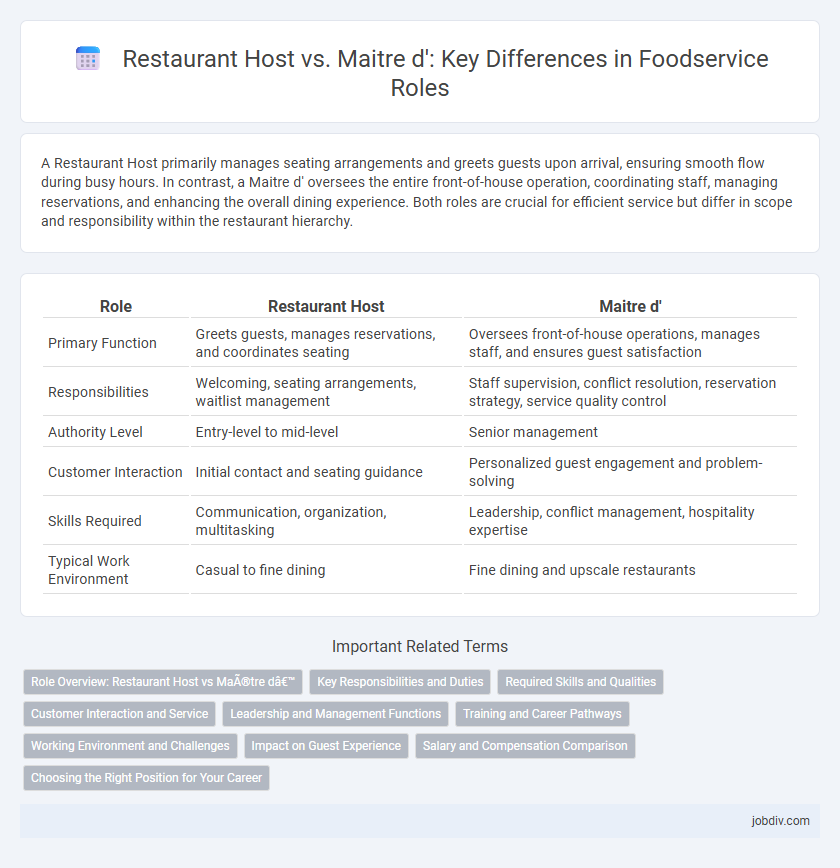A Restaurant Host primarily manages seating arrangements and greets guests upon arrival, ensuring smooth flow during busy hours. In contrast, a Maitre d' oversees the entire front-of-house operation, coordinating staff, managing reservations, and enhancing the overall dining experience. Both roles are crucial for efficient service but differ in scope and responsibility within the restaurant hierarchy.
Table of Comparison
| Role | Restaurant Host | Maitre d' |
|---|---|---|
| Primary Function | Greets guests, manages reservations, and coordinates seating | Oversees front-of-house operations, manages staff, and ensures guest satisfaction |
| Responsibilities | Welcoming, seating arrangements, waitlist management | Staff supervision, conflict resolution, reservation strategy, service quality control |
| Authority Level | Entry-level to mid-level | Senior management |
| Customer Interaction | Initial contact and seating guidance | Personalized guest engagement and problem-solving |
| Skills Required | Communication, organization, multitasking | Leadership, conflict management, hospitality expertise |
| Typical Work Environment | Casual to fine dining | Fine dining and upscale restaurants |
Role Overview: Restaurant Host vs Maître d’
A Restaurant Host primarily greets guests, manages reservations, and facilitates seating arrangements to ensure efficient table turnover and guest satisfaction. The Maitre d' oversees the dining room operations, coordinates staff, manages guest relations, and ensures a high-quality dining experience with attention to service standards and guest needs. Both roles are critical in foodservice, but the Maitre d' carries greater responsibility in leadership and overall service management.
Key Responsibilities and Duties
A Restaurant Host primarily manages guest seating, reservations, and greeting customers to ensure a smooth dining experience, while a Maitre d' oversees the entire front-of-house operations, including staff coordination, customer service quality, and handling special requests. Hosts focus on efficient table assignments and waitlist management, whereas Maitre d's take on greater leadership responsibilities such as supervising service standards and resolving guest complaints. Both roles aim to enhance customer satisfaction, but the Maitre d' holds a more strategic position with broader operational duties in a restaurant setting.
Required Skills and Qualities
A Restaurant Host requires strong interpersonal skills, including excellent communication and the ability to manage reservations and seating efficiently, ensuring a welcoming atmosphere. A Maitre d' demands advanced leadership qualities, deep knowledge of menu and wine pairings, and expertise in overseeing service staff to maintain high dining standards. Both roles prioritize customer service, but the Maitre d' also emphasizes management and coordination skills within upscale dining environments.
Customer Interaction and Service
Restaurant hosts primarily manage guest seating and initial greetings, ensuring smooth flow and timely table turnover, while maitres d' oversee the entire dining room ambiance and coordinate staff to enhance customer experience. Hosts focus on efficient customer interaction during arrival, maintaining waitlists and reservations, whereas maitres d' engage in more personalized service, addressing guest needs and resolving issues throughout the meal. The maitre d' role demands advanced communication skills and leadership to elevate service quality, contrasting with the host's emphasis on frontline guest engagement.
Leadership and Management Functions
A Restaurant Host primarily manages guest seating and front-of-house flow, ensuring efficient table turnover and positive first impressions, which supports overall customer satisfaction. In contrast, the Maitre d' holds a broader leadership role, overseeing service staff, coordinating dining room operations, and resolving guest issues to maintain service quality and staff performance. Both roles require strong management skills, but the Maitre d' typically exercises greater authority in strategic decision-making and team leadership within the restaurant.
Training and Career Pathways
Restaurant hosts typically undergo entry-level training focused on customer service and reservation management, serving as the first point of contact for guests. Maitre d' roles require advanced hospitality training, including skills in staff coordination, seating strategy, and often leadership development, paving the way for management positions. Career pathways for hosts may lead to supervisory roles or transition into the maitre d' track, which often culminates in executive restaurant management or hospitality director positions.
Working Environment and Challenges
A Restaurant Host typically manages the front-of-house environment by greeting guests and organizing reservations in fast-paced, high-traffic settings that demand strong multitasking skills and adaptability. In contrast, a Maitre d' oversees the dining room's overall ambiance and staff coordination, often in upscale establishments where precision and leadership under pressure are crucial. Both roles face challenges such as handling peak service times and maintaining customer satisfaction, but the Maitre d' must also navigate complex team dynamics and uphold fine dining standards.
Impact on Guest Experience
A restaurant host is primarily responsible for greeting guests and managing seating arrangements, which directly affects the initial impression and flow of service. The maitre d' oversees the overall dining room operations and staff coordination, playing a crucial role in maintaining service quality and guest satisfaction throughout the meal. Both roles significantly influence the guest experience by ensuring smooth transitions and personalized attention, enhancing the restaurant's reputation and customer loyalty.
Salary and Compensation Comparison
Restaurant hosts typically earn an average hourly wage of $11 to $15, reflecting entry-level responsibilities such as greeting guests and managing reservations. Maitre d's command higher salaries, often ranging from $35,000 to $55,000 annually, due to their expanded duties including supervising front-of-house staff and ensuring dining experience quality. Compensation packages for maitre d's may also include bonuses and tips, increasing total earnings beyond base salary.
Choosing the Right Position for Your Career
Choosing between a Restaurant Host and a Maitre d' depends on your career goals and desired responsibilities within the foodservice industry. Restaurant Hosts primarily manage guest seating, reservations, and initial customer interactions, ideal for those seeking entry-level front-of-house roles with customer service emphasis. Maitre d' positions demand advanced skills in leadership, table management, and customer relations, suited for professionals aiming for supervisory roles and greater influence on dining room operations.
Restaurant Host vs Maître d’ Infographic

 jobdiv.com
jobdiv.com